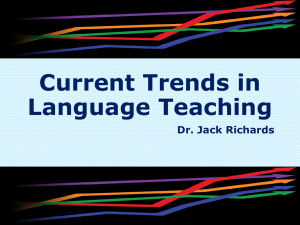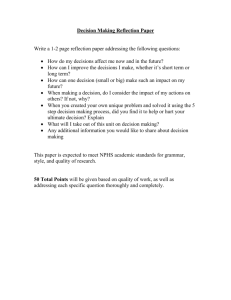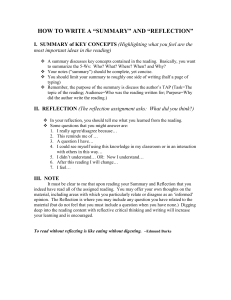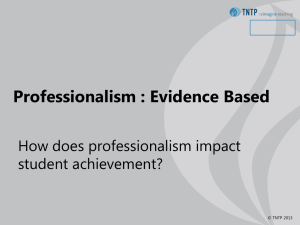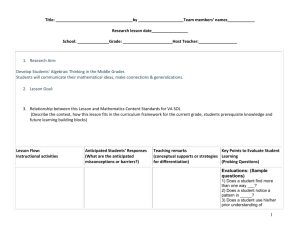Proposal/Paper Template
advertisement
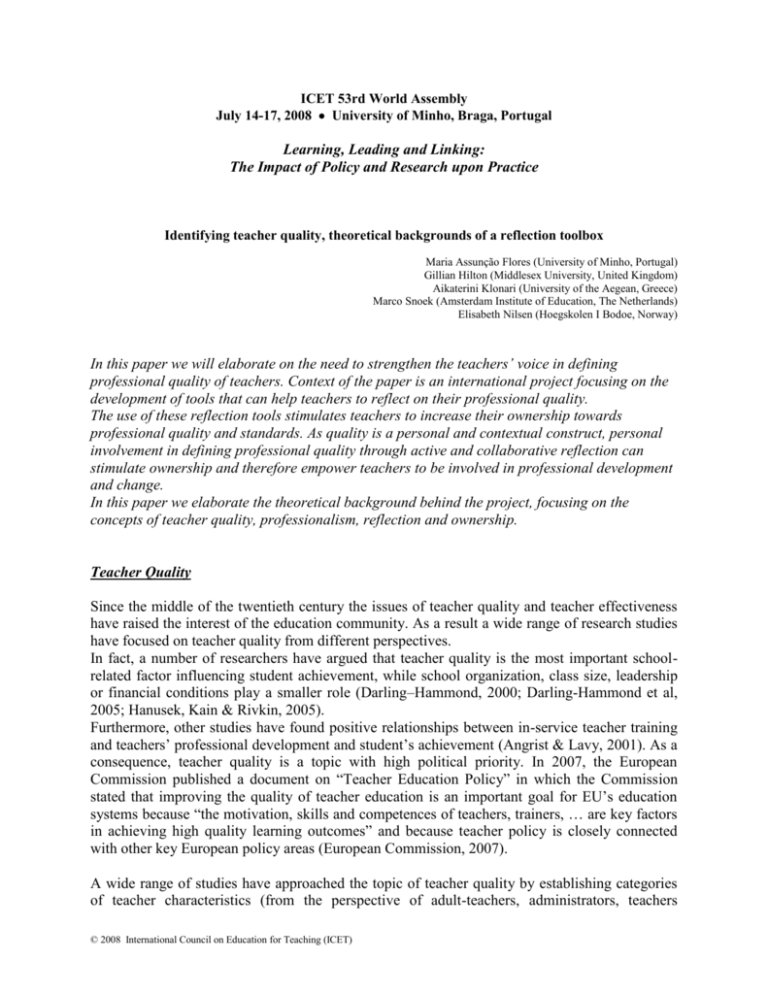
ICET 53rd World Assembly July 14-17, 2008 University of Minho, Braga, Portugal Learning, Leading and Linking: The Impact of Policy and Research upon Practice Identifying teacher quality, theoretical backgrounds of a reflection toolbox Maria Assunção Flores (University of Minho, Portugal) Gillian Hilton (Middlesex University, United Kingdom) Aikaterini Klonari (University of the Aegean, Greece) Marco Snoek (Amsterdam Institute of Education, The Netherlands) Elisabeth Nilsen (Hoegskolen I Bodoe, Norway) In this paper we will elaborate on the need to strengthen the teachers’ voice in defining professional quality of teachers. Context of the paper is an international project focusing on the development of tools that can help teachers to reflect on their professional quality. The use of these reflection tools stimulates teachers to increase their ownership towards professional quality and standards. As quality is a personal and contextual construct, personal involvement in defining professional quality through active and collaborative reflection can stimulate ownership and therefore empower teachers to be involved in professional development and change. In this paper we elaborate the theoretical background behind the project, focusing on the concepts of teacher quality, professionalism, reflection and ownership. Teacher Quality Since the middle of the twentieth century the issues of teacher quality and teacher effectiveness have raised the interest of the education community. As a result a wide range of research studies have focused on teacher quality from different perspectives. In fact, a number of researchers have argued that teacher quality is the most important schoolrelated factor influencing student achievement, while school organization, class size, leadership or financial conditions play a smaller role (Darling–Hammond, 2000; Darling-Hammond et al, 2005; Hanusek, Kain & Rivkin, 2005). Furthermore, other studies have found positive relationships between in-service teacher training and teachers’ professional development and student’s achievement (Angrist & Lavy, 2001). As a consequence, teacher quality is a topic with high political priority. In 2007, the European Commission published a document on “Teacher Education Policy” in which the Commission stated that improving the quality of teacher education is an important goal for EU’s education systems because “the motivation, skills and competences of teachers, trainers, … are key factors in achieving high quality learning outcomes” and because teacher policy is closely connected with other key European policy areas (European Commission, 2007). A wide range of studies have approached the topic of teacher quality by establishing categories of teacher characteristics (from the perspective of adult-teachers, administrators, teachers © 2008 International Council on Education for Teaching (ICET) Flores, Hilton, Klonari, Snoek & Nilsen, Identifying Teacher Quality educators, educational researchers and students). These studies have lead to list of teachers’ competences (knowledge, skills, and dispositions) related to students performance (Izumi & Evers, 2002; Rice, 2003), identifying several areas of knowledge and skills in effective teachers. These teachers have extensive subject knowledge, good knowledge of pedagogy (teaching strategies and methods of instruction). Also, essential skills frequently identified in research are management and organizational skills (in classroom and in school), social (interpersonal) skills such as communication, skills to work with others in a wide range of environment, skills to guide and support learners (e.g. motivating, encouraging and rewarding students), teaching skills (e.g. in using state objectives of learning, using innovative teaching methods, using instructional methods that foster critical thinking, involving students actively in learning, etc.). In addition these studies inform us about personal attitudes, values and ethical behavior of quality teachers. Repeatedly, these are listed as being respectful, democratic, fair, caring, understanding, positive, approachable, open minded, having a sense of humor, autonomy, responsibility, etc. (Evans, 2002; Rogers & Renard, 1999; Harris, 1998; Kauchak & Egan, 1998; Wong & Wong, 1998; Graham, 1995a&b; Myers & Myers, 1995). As a result of these studies, descriptive lists trying to identify the key elements of a teachers’ quality have become standards for teacher preparation (Wong & Wong, 1998; Myers & Myers, 1995; Saphier & Gower 1987), a basis for staff development (Danielson, 1996) and a guideline for teacher evaluation (Flores, 1999) in Europe and many countries all over the world. From these formal documents about the qualifications of teachers that are used in European member states, we can distinguish two broad categories of teacher standards. The first category includes requirements for qualification of teachers and concerns the Academic profile of teachers and contains measurable and policy relevant indicators such as teacher preparation programs and degrees, teacher coursework, teacher experience, teachers’ own test scores (self reflection and self evaluation) etc. while the second category includes many personal (moral and emotional) characteristics important for a good teacher which are not always measurable (personal and interpersonal attitudes and values, etc). While many attempts are being made to define objective general standards for teacher quality, the subjective part of teacher quality can not be ignored. Quality is also a complex multifaceted personal construct, reflecting the views on learning that the teacher and the learner (and other stakeholders) use and that depends on the specific local context of teacher and learner. From the perspective of the teacher this can be characterized by the phrase ‘You teach by who you are’. Although this personal quality construct can not be defined in an objective way, it can be discussed. By discussing this, it is important that teachers within a school, but also the learners involved, create a shared understanding on what they define locally as teacher quality and quality of education. When such an understanding is reached, it can be shared with others outside the school and be subject for accountability and dialogue. Teacher Quality and Professionalism The attempts to identify standards for teacher quality have lead to a wide variety of standards, varying from narrow, instrumental versions of teaching, to more broadly based approaches to professionalism. This variety illustrates the variety of views on the nature of teacher professionalism. Professionalism is a dynamic and contextual construct, and therefore, it is subject to different, and sometimes competing, interpretations, analyses and ‘voices’ (Helsby, 2000; Hargreaves, © 2008 International Council on Education for Teaching (ICET) 2 Flores, Hilton, Klonari, Snoek & Nilsen, Identifying Teacher Quality 2000). It reflects the ways in which the teachers’ role is understood on a broader and political level and the kinds of competencies expected from them, but it also reflects how teachers see their work and themselves as professionals (Flores, 2005). McCulloch, Helsby and Knight (2000, p.118) make the point that: ‘Educational improvement depends on teachers wanting to make a difference. It depends upon their feeling professional. Neither raising standards by regulation nor professionalizing by prescription will work. Teachers have power in the sense that they have to want improvement for improvement to happen.’ Hoyle’s (1974) distinction between ‘restricted’ and ‘extended’ professionalism has been used over the years to describe teachers’ work, the former being classroom-centred, intuitive and based on experience; the latter being understood in a broader perspective embracing the social context of education and implying collaboration and confrontation amongst teachers who, unlike restricted professionals, are interested in theory and educational developments. The current debate about teacher professionalism is marked by contradictory (and post-modern) views of the nature of teachers’ work in the twenty-first century. Conflict, ambiguity and ambivalence are issues which have been highlighted in recent research on this topic as far as teacher professionalism is concerned (Day, Flores & Viana, 2007). Both McCulloch et al. (2000) and Flores and Shiroma (2003) indicate that externally imposed orientations to teacher professionalism do not work, in a straightforward way, in a field marked by ambiguity, uncertainty and increasing complexity. In other words, teachers may respond differently to ‘imposed’ changes, ranging from ‘compliance’ to empowerment and ‘pro-activism’. Whitty (2000) for instance, draws attention to different and contradictory elements in current reforms in England and Wales, suggesting the co-existence of different kinds of teacher ‘professionalisms’. These embody different views of teaching and being a teacher and different ways of looking at the changing nature of teaching. Apart from the political, cultural, social contexts in which it is framed, the vision and ways in which teachers look at themselves as professionals (and their sense of identity) needs to be considered to be able to understand and (re)define the nature and scope of teacher professionalism: ‘For at the end of the day, teacher professionalism is what teachers and others experience it as being, not what policy makers and others assert it should become. The experience of professionalism and of its denial are to be found by studying the everyday work of teaching.’ (Goodson & Hargreaves, 1996: 22-23) As teaching is becoming more and more complex and demanding, this has implications for teacher professionalism, which, as described above, is characterised by different (and conflicting) views in recent times. As Day (1999, p.12) states: ‘changes in the operational practice of ‘professionalism’ reflect the increasing complexities and contradictions of teachers’ work (...) Their work embodies both challenge and threat. They may be both autonomous and accountable to others, independent and collaborative, in control and not in control, teacher and child centred.’ For instance in the Portuguese context, Flores (2005) found that uncertainty, ambiguity and tension were recurring words in defining Portuguese teachers’ sense of professionalism in times © 2008 International Council on Education for Teaching (ICET) 3 Flores, Hilton, Klonari, Snoek & Nilsen, Identifying Teacher Quality of change, stressing the dilemmas and challenges teachers have been confronted with and the ways in which they are responding to them. Sachs (2000) develops her vision of the new kind of professionalism drawing upon a broader democratic form of professionalism, which emphasises collaboration and co-operative action between teachers and other education stakeholders. Teachers are assumed to play a broader role, which goes beyond the boundaries of the classroom, to include the contribution to the school, the system and the wider community by holding collective responsibilities as a group. This changing nature of teachers’ work requires teachers to be professionals and proactive in order to respond adequately to the ambiguity, uncertainty and increasing complexity which characterise the educational settings in which they are expected to operate. At the same time, they experience increased bureaucracy, public scrutiny and accountability, which are often associated with new forms of managerialism within a market-oriented view of education. As Flores and Shiroma (2003, p.16) argue, it is essential to “go beyond the recognition of teachers’ role in society and to provide them with real conditions (including adequate and meaningful training opportunities) to redefine and challenge their professionalism”. This implies that the extended professionalism of teachers is both an issue of ‘reality-as-it-is’ and ‘reality-to-be’. It reflects the role that teachers play in everyday life and the self-awareness and commitment that many teachers feel towards their profession and by which they are engaged in learning processes of their students. At the same time, this extended and interactive professionalism can not be taken for granted as many teachers (due to a variety of reasons) do not show all aspects of this professionalism in their daily routine. So the statement that teachers are professionals also implies a course for development of the professionalism of individual teachers and of the curriculum within teacher education. Teacher quality, reflection and professional change In many countries national and international standards for teachers have been developed in the last years. In many cases this has been motivated by the need for national control and accountability for the teachers. However, descriptions of teacher quality are not only instruments for control and accountability, but also instruments for professional development and professional change. In these processes of professional development and change, reflection is a crucial process. In teacher’s everyday practice, the simplest way of reflecting is to compare actual experience with past experience. Did the practical solutions work, compared to last time? Using this type of reflection, the teacher leans to routines. Or he can compare the actual practice with examples he has seen or heard about from other teachers. Through this type of reflection the teacher leans to tradition. The complexity of teaching and learning situations often creates a need for control and for more simple solutions. (Loughran, 2006) This can force the teacher to stick to routines and traditional solutions. The problem, however, is that every teaching situation is a unique and contextual situation. It is never the same as “last time” or as “the other teacher with the other class”. A third approach to reflection is to compare actual experiences with personal expectations: expectations with respect to learning outcomes of pupils, expectations with respect to the active involvement of pupils in learning activities, etc. This kind of reflection focuses on personal © 2008 International Council on Education for Teaching (ICET) 4 Flores, Hilton, Klonari, Snoek & Nilsen, Identifying Teacher Quality subjective satisfaction, leading to a ‘trial and error approach’: this didn’t work, let’s try it different next time. However, education, as all professional practice, is a normative activity. This means that it must build on norms of quality that have to be made explicit. To be normative the action must have an element of reflection, seeing the respective practice in a normative perspective. Schön talks about “reflective conversation with the situation”. (Schön, 1983) And to be professional, the norms have to be shared among the professionals. Therefore, reflection should not only give insight in the ‘self’ (personal impressions and feelings) and the personal level of performance, but also in the norms of the profession, in the level to reach. Sadler (in Gibbs & Simpson, 2004) calls the norms of the profession the ‘guild knowledge’ of the profession, the quality indicators for professional performance shared by the members of a profession. Such standards are developed through a professional discourse; discussions with colleagues. As a result the reflection process needs to focus on two aspects: on the actual performance (connected to former experience, routines, personal tradition or personal values), but to be professional, the teacher’s reflection must also have reference to internalized professional values and shared professional standards. Only in such a perspective, a tension is created between the actual level of professional competence and the ‘ideal’ level of professional competence. This tension can be a powerful motor for professional learning. This perspective on reflection is especially important within teacher education. In the training programs for other professionals who in their work are responsible for complex and risky tasks (for example pilots and doctors) the students are given practical experience and the possibility to reflect on their experience, in simulated or simplified situations, before they are “left alone” in a real situation. In the pre- and in-service education of teachers students are often out in teaching practice, experiencing the complex reality of the work of a teacher very early. This can give the students the impression that teaching is a simple task. And that it is acceptable to choose simple solutions in their practice. The result can be a routine-based teaching practice with too little reflection. To stimulate professional development, we should focus on teaching as problematic and complex (Loughran, 2006). But then the teachers have to learn to reflect on and evaluate teaching practice according to professional quality standards. From a social-constructivist point of view, learning is both a social and a personal process where a learner adapts his/her ideas and convictions to new knowledge and understanding in an interactive dialogue. This has implications for the engagement of teachers in processes of professional development and change. When teachers feel ownership towards a shared definition of professional quality (the ‘guild knowledge’) or towards the change process, professional development and change are more likely to occur (Fullan, 2007). According to Fullan, ownership of quality through reflection involves and improves thinking about planning and the changing of approaches. It encourages adaptation and most importantly results in meta-cognition, an understanding of one’s own learning. The case for ownership of change by self-reflection is supported by Hopkins et al (1994, in Fullan, 1999) who point out that having the control of initiatives for change is essential for the individual if success is to be assured. Rea (in Bush & Middlewood, 2005) also stresses the need for self-motivation to bring about change. Fullan (2007) adds further to this argument by professing that ownership is essential if change is to be ‘a progressive process’ in that it has to encourage and bring out commitment and increase skills. Foskett and Lumby (2003) indicate that imposing change and forcing up quality from outside, can be counter productive. Improving quality as a continuing goal in education requires, they © 2008 International Council on Education for Teaching (ICET) 5 Flores, Hilton, Klonari, Snoek & Nilsen, Identifying Teacher Quality profess, autonomy for institutions and individuals. Imposition from governments or cultural systems which are based in hierarchies often does not result in the desired improvement. Fullan suggests that change can be successfully introduced and initiated if the people involved are engaged with the problems they face, whilst Somekh (2000) points out that this is related to an understanding of the teaching and learning process and what they actually want to achieve. Teacher quality in an interactive dialogue Teachers’ work in the daily practice in school is influenced by decisions taken at the political level and at the policy level (both international, national, regional and local) and by knowledge that is developed through academic research. When teaching is seen as a profession that requires extended and interactive professionalism, teachers need to be involved in decisions influencing practice within schools. At the same time, when policy aims at effective implementation within the school, it is necessary to take into account the reality of practice in the school. And finally, when researchers have the ambition that their findings are implemented in school practice, they need to translate their findings to concrete suggestions for practice in schools and to involve teachers in research on their own practice. As a result, teaching practice, educational research and educational policy need to be developed in interaction. This gives a responsibility to policy makers (to involve researchers and practitioners in the process of policy development and implementation), to researchers (to communicate with practitioners and policy makers and to focus on their needs and questions) and for teachers as practitioners (to be willing to engage in discussions on policy and to be involved in educational research and its translation to practice). (Goodson, 1992) From the analysis above, it can be concluded that teachers’ professionalism should be based on a drive for quality from within, based on a clear reflection on and understanding of the teacher’s actual level of performance as related to shared and internalized professional standards created through a professional discourse. However in many national or European processes to identify teacher quality, standards are developed by government dominated organizations where active involvement of teachers is limited. The risk is that teachers feel no ownership towards national standards for professional quality. As a consequence such standards might frustrate the professionalism of teachers and have a very limited impact on the professional development of teachers. The ITQ project In 2006, 22 teacher education institutions in 12 European countries started the Identifying Teacher Quality project. The ITQ project is a three year international project, funded by the European Socrates programme, focusing on the development of reflection tools for teachers to reflect on their professional quality. The aim of the project is to support teachers in Europe to strengthen their professional quality by developing a toolbox with tools that enables teachers (and other stakeholders) to recognize, to reflect upon and to evaluate teacher quality. Based on the analyses above, the project used six statements to justify the choices that have been made with respect to the aim en intended outcomes of the project. © 2008 International Council on Education for Teaching (ICET) 6 Flores, Hilton, Klonari, Snoek & Nilsen, Identifying Teacher Quality 1 2 3 4 5 6 Teachers are professionals Reflection on professional quality is a stimulus for professional development Ownership is a condition for learning and change Quality is a personal and contextual construct Personal involvement in defining professional quality stimulates ownership and therefore learning and change Education asks for an interactive relation between policy, research and practice By engaging teachers in reflections on their professional quality we hope to help teachers to gain increased ownership of their professional quality, by Empowering teachers to participate in national or regional debates on teacher quality; Stimulating reflection on different aspects of teacher quality; Stimulating collaborative learning of teachers both with respect to individual professional development and with respect to school development processes, leading to a shared language; Stimulating sensitivity to and mutual understanding of concerns of other stakeholders. To reach these aims, the toolbox will include a variety of reflection tools, using different sources for reflection and stimulating different learning styles: Reflection tools using outside sources to stimulate reflection (e.g. formal descriptions of teacher quality like national teacher standards; research publications on effective teaching and learning, etc.); Reflection tools using observations of classroom practice (e.g. through video recordings of class room practices); Reflection tools using shared experiences (e.g. through reflection on ‘your most remarkable teacher’ and diary writing and the exchange of these reflections); Reflection tools using creative and expressive activities (e.g. role plays to understand concerns and perspectives of other stakeholders, drawings, use of metaphors, etc.); All tools will stimulate reflection on teacher quality (‘what is …’) and on the identification of indicators of teacher quality (‘how to observe …’). Through the variety of tools different ways and styles of learning will be stimulated: investigation, self generating, analysis, exploration, examination/evaluation, identifying, expressive/creative. The toolbox can be used in pre-service and in-service teacher education, in national projects on teacher quality and in processes of school development and can focus both on teacher quality in general and on a specific theme like teaching diversity. The project design involves the development of the draft versions of the tools (2006-2007). These first draft versions of the tools have been made available on the internet (www.teacherqualitytoolbox.eu). In the second project year the draft tools which will be tested in pilots in a variety of contexts (2007-2008) including an intensive Comenius course (Oct. 2008). The pilots will be evaluated with a variety of evaluation instruments. In the final year (20082009), the tools will be adapted based on the outcomes of the evaluations and the final tools will be disseminated through website, workshops and publications. © 2008 International Council on Education for Teaching (ICET) 7 Flores, Hilton, Klonari, Snoek & Nilsen, Identifying Teacher Quality Evaluation of the tools The evaluative and comparative research that will be organized parallel to the testing of the toolbox and its instruments has three aims: The evaluative research focuses on the learning effects and on the subjective judgments on effectiveness and satisfaction as perceived by the participants. Data will be collected through self-evaluation journals by teachers who use the tools and by feedback from participants through systemized evaluation forms. Through this research the underlying assumptions that are the base for the design of the instruments are tested. The outcomes of the evaluative research will be summarized in an evaluation report which will be used to improve the toolbox and its instruments before dissemination. A survey of the outcomes of the reflections of the participants. This comparative research will focus on the ways in which participants in the tool pilots throughout Europe identify teacher quality and compare those with formal documents that define teacher quality on national or European levels. The results of this comparative research can provide new perspectives in national and European debates on teacher quality and the development of effective teacher policies. The evaluation will also focus on the design process and will evaluate the effectiveness of the interactive design process and the underlying assumptions. The results of the project (the tools and outcome of the survey) will be published on the website and the possibilities to publish the results in a book will be investigated. Concluding remarks In this project our ambition is to give teachers (and teacher students) the possibility to reflect on teaching and learning together with colleagues in practical situations out of practice. The use of simulated situations (role-play), observed situations ex post facto (videos), texts (national policy documents), reflective writing and so on, will give teachers time and possibility to reflect and discuss quality in teaching together in a social, collegial learning situation. The creative and expressive tools can be a “professional play”, without the threat of being at a glance in a real and authentic teaching situation (Mitchell & Weber, 1996). If reflection is to be the cornerstone in programs for learning to be a professional teacher, it must have a central place both in pre-service teacher education and in in-service training for teachers. The reflection tools developed through this project can be used to develop learning situations that are not as complex as the everyday life, and that gives the possibility to reflect about teacher quality together with colleagues in order to develop shared quality standards. In this way a shared awareness of professional quality, a common professional language and knowledge base, common values and understanding can be developed. Professional selfconsciousness and willingness to continuous professional development can be the result. This is a strategy for empowering teachers and giving them a voice in the debates about teacher quality. It is clear for us, that involving all practitioners in the quality enhancement process and helping them to feel that they are an essential part of the search for teacher quality is preferable and more likely to succeed than quality standards imposed from outside. This is a continuing problem in the education systems across the world with a variety of stakeholders, governments, parents, © 2008 International Council on Education for Teaching (ICET) 8 Flores, Hilton, Klonari, Snoek & Nilsen, Identifying Teacher Quality students and the media continuing to impose ideas on practitioners rather than motivating, aiding and trusting the profession and the individual professionals to improve quality from within the system and themselves. Therefore, for change to occur, ownership of that change aided by the medium of reflection is essential for success. References ANGRIST, J.D. & LAVY, V. (2001). Does Teachers Training Affect Pupil Learning? Evidence from Matched Comparisons in Jerusalem Public Schools. Journal of Labor Economics 19(2), pp. 343-369. BUSH T. & MIDDLEWOOD D. (2005). Leading and Managing People in Education. London: Sage. DANIELSON, C. (1996). Enhancing professional practice: A framework for teaching. Alexandria, VA: ASCD. DARLING-HAMMOND, L. (2000). Teacher Quality and Student Achievement: A Review of State Policy Evidence. Education Policy Analysis Archives, 8 (1). DARLING-HAMMOND, L.; HOLTZMAN, J.D.; GATLIN, S. & HEILING, V. J. (2005). Does Teacher Preparation Matter? Evidence about Teacher Certification, Teach for America, and Teacher Effectiveness. Education Policy Analysis Archives, 13(42), pp. 1-51. DAY, C. (1999). Developing Teachers. The Challenges of Lifelong Learning. London: Falmer Press. DAY, C.; FLORES, M. A. & VIANA, I. (2007). Effects of national policies on teachers’ sense of professionalism: findings from an empirical study in Portugal and in England. European Journal of Teacher Education, 30 (3), pp. 249-266. EVANS, F.J. (2002). Effective Teachers: An investigation from the Perspectives of Elementary School Students. Action Teach Education 24 (3), pp. 51-62. EUROPEAN COMMISSION (2007). Improving the Quality of Teacher Education, COM 392 final, Brussels: European Commission. (http://ec.europa.eu/education/com392_en.pdf) FLORES, S. (1999). Classrooms as cultures from a principal’s perspective. Primary Voices K-6, 7(3), pp. 54. FLORES, M. A. (2005). Teachers’ views on recent curriculum changes: tensions and challenges. The Curriculum Journal, 16 (3), pp. 401-413. © 2008 International Council on Education for Teaching (ICET) 9 Flores, Hilton, Klonari, Snoek & Nilsen, Identifying Teacher Quality FLORES, M. A. & SHIROMA, E. (2003). Teacher Professionalisation and Professionalism in Portugal and Brazil: What do the policy documents tell? Journal of Education for Teaching, 29 (1), pp. 5-18. FOSKETT, N & LUMBY, J. (2003). Leading and Managing Education; International Dimensions. Camden: Paul Chapman Publishing. FULLAN, M. (1999). Change Forces: the Sequel. London: Falmer Press. FULLAN, M. (2007). The new meaning of educational change, 4th edition. Teachers College Press. GIBBS, G & C. SIMPSON (2004). Does your assessment support your students’ learning? Journal of Learning and eaching in Higher Education, 32(2), pp. 175-187. GOODSON, I. F. (1992). Sponsoring the teacher’s voice: Teachers’ lives and teacher development. In A. Hargreaves & M. Fullan (Eds.), Understanding teacher development. pp. 110-121. New York: Teachers College Press. GOODSON, I. & HARGREAVES, A. (eds) (1996). Teachers’ Professional Lives. London: Falmer Press. GRAHAM, G. (1995a). Physical education through students’ eyes and in students’ voices: Introduction. Journal of Teaching in Physical Education, 14(4), pp. 364-371. GRAHAM, G. (1995b). Physical education through students’ eyes and in students’ voices: Implications for teachers and researchers. Journal of Teaching in Physical Education, 14(4), pp. 478-485. HANUSEK, A.E.; KAIN, F.J. & RIVKIN, G.S. (2005). Teachers, Schools, and Academic Achievement, Econometrica, 73(2), pp. 417-458. HARGREAVES, A. (2000). Four Ages of Professionalism and Professional Learning, Teachers and Teaching: Theory and Practice, 6 (2), pp. 151-182. HARRIS, A. (1998). Effective teaching: A review of the literature. School Leadership & Management 18(2), pp. 169-183. HELSBY, G. (2000) Multiple Truths and Contested Realities. The Changing Faces of Teacher Professionalism in England. In C. Day; A. Fernandez; T. E, Hauge & J. Moller (Eds). The Life and Work of Teachers. International Perspectives in Changing Times, pp. 93-108. London: Falmer Press. HOPKINS, D.; AINSCOW, M. & WEST, M (1994) School Improvement in an Era of Change. London: Cassell. HOYLE, E. (1974). Professionality, Professionalism and Control in Teaching, London Education Review 3(2), pp. 13–19. © 2008 International Council on Education for Teaching (ICET) 10 Flores, Hilton, Klonari, Snoek & Nilsen, Identifying Teacher Quality IZUMI, T. L. & EVERS, M. W. (Eds) (2002). Teacher Quality. Stanford: Hoover Press. KAUCHAK, D.P. & EGAN, P.D. (1998). Learning and teaching: Research-based methods. Boston: Allyn & Bacon. LOUGHRAN, J. (2006). Developing a Pedagogy of Teacher Education . Understanding teaching and learning about teaching. London/New York: Routledge/Falmer Press. MCCULLOCH, G.; HELSBY, G. & KNIGHT, P. (2000). The Politics of Professionalism. Teachers and the Curriculum. London: Continuum. MITCHELL, C. & WEBER, S (1996). Reinventing ourselves as Teachers: Private and Social Acts of Memory and Imagination. London: Falmer Press MYERS, C.B. & MYERS, L.K. (1995). Effective teaching practices. In: The Professional Educator. Boston: Wadsworth, pp. 82-115. RICE, K.J. (2003). Teacher Quality: Understanding the Effectiveness of Teacher Attributes. Washington: Economic policy Institute. ROGERS, S. & RENARD, L. (1999). Relationship-driven teaching. Educational Leadership, Sept. 1999, pp. 34-38. SACHS, J. (2000). The Activist Professional, Journal of Educational Change, 1 (1), pp.77-95. SAPHIER, J. & GOWER, R. (1987). The skillful teacher: Building your teaching skills. Carlisle, MA: Research for better Teaching. SCHÖN, D. A. (1983). The reflective Practitioner: How Professionals Think in Action. New York: Basic Books. SOMEKH, B. (2000). Changing conceptions of action research. In: H. Altricher & J. Elliott (eds.) Images of Educational Change. Buckingham: Open University Press. WHITTY, G. (2000). Teacher Professionalism in New Times, Journal of In-Service Education, 26 (2), pp. 281-295. WONG, H.K. & WONG, M.T. (1998). How to be an effective teacher: The first days of school. Mountain View, CA: Harry Wong Publications. © 2008 International Council on Education for Teaching (ICET) 11
